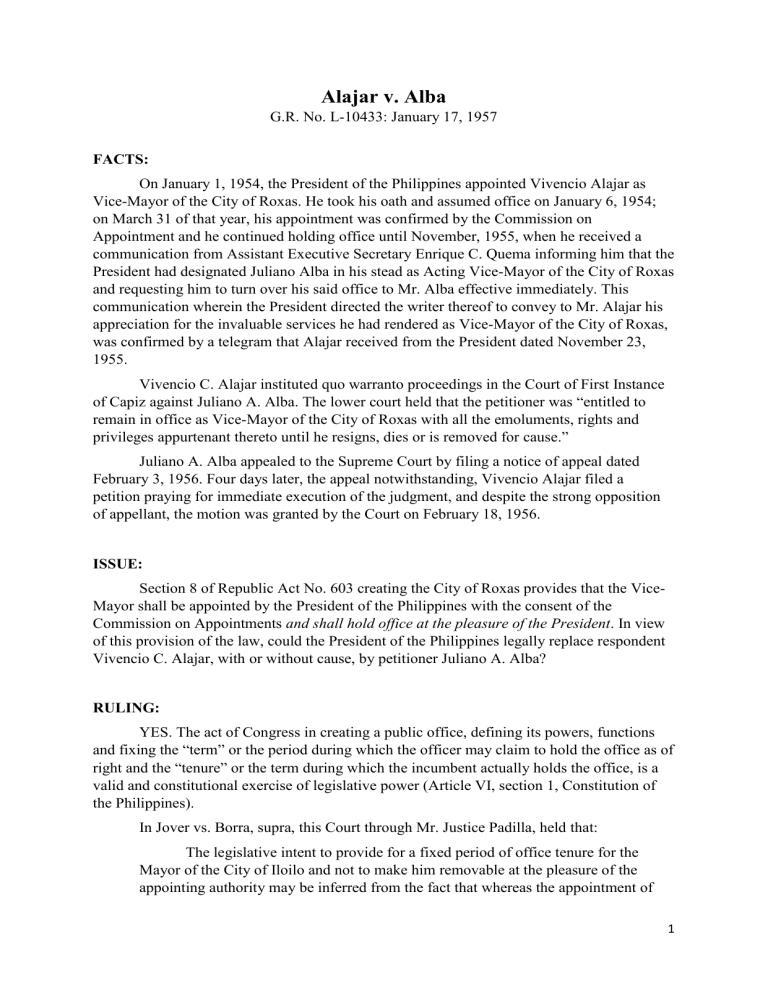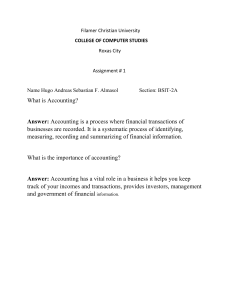
Alajar v. Alba G.R. No. L-10433: January 17, 1957 FACTS: On January 1, 1954, the President of the Philippines appointed Vivencio Alajar as Vice-Mayor of the City of Roxas. He took his oath and assumed office on January 6, 1954; on March 31 of that year, his appointment was confirmed by the Commission on Appointment and he continued holding office until November, 1955, when he received a communication from Assistant Executive Secretary Enrique C. Quema informing him that the President had designated Juliano Alba in his stead as Acting Vice-Mayor of the City of Roxas and requesting him to turn over his said office to Mr. Alba effective immediately. This communication wherein the President directed the writer thereof to convey to Mr. Alajar his appreciation for the invaluable services he had rendered as Vice-Mayor of the City of Roxas, was confirmed by a telegram that Alajar received from the President dated November 23, 1955. Vivencio C. Alajar instituted quo warranto proceedings in the Court of First Instance of Capiz against Juliano A. Alba. The lower court held that the petitioner was “entitled to remain in office as Vice-Mayor of the City of Roxas with all the emoluments, rights and privileges appurtenant thereto until he resigns, dies or is removed for cause.” Juliano A. Alba appealed to the Supreme Court by filing a notice of appeal dated February 3, 1956. Four days later, the appeal notwithstanding, Vivencio Alajar filed a petition praying for immediate execution of the judgment, and despite the strong opposition of appellant, the motion was granted by the Court on February 18, 1956. ISSUE: Section 8 of Republic Act No. 603 creating the City of Roxas provides that the ViceMayor shall be appointed by the President of the Philippines with the consent of the Commission on Appointments and shall hold office at the pleasure of the President. In view of this provision of the law, could the President of the Philippines legally replace respondent Vivencio C. Alajar, with or without cause, by petitioner Juliano A. Alba? RULING: YES. The act of Congress in creating a public office, defining its powers, functions and fixing the “term” or the period during which the officer may claim to hold the office as of right and the “tenure” or the term during which the incumbent actually holds the office, is a valid and constitutional exercise of legislative power (Article VI, section 1, Constitution of the Philippines). In Jover vs. Borra, supra, this Court through Mr. Justice Padilla, held that: The legislative intent to provide for a fixed period of office tenure for the Mayor of the City of Iloilo and not to make him removable at the pleasure of the appointing authority may be inferred from the fact that whereas the appointment of 1 the Vice-Mayor of the same city, as provided for in an amendatory act, and those of the Mayors and Vice-Mayor of other cities are at pleasure, that of the Mayor of the City of Iloilo is for a fixed period of time, as provided for in the original charter, and in this continued unchanged despite subsequent amendatory acts. The logical inference from the above quoted excerpt of the decision of this Court promulgated long after the decision rendered in the case of De los Santos vs. Mallare, supra, is that Congress can legally and constitutionally make the tenure of certain officials dependent upon the pleasure of the President. The pervading error of the respondents lies in the fact that they insist on the act of the President in designating petitioner Alba in the place of respondent Alajar as one of removal. The replacement of respondent Alajar is not removal, but an expiration of its tenure, which is one of the ordinary modes of terminating official relations. Clearly, what is involved here is not the question of removal, or whether legal cause should precede or not that removal. What is involved here is the creation of an office and the tenure of such office, which has been made expressly dependent upon the pleasure of the President. 2


